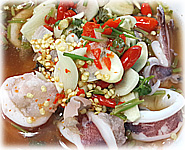Thai Food Article | What Makes Thai Food So Hot?
It's all in the chilli pepper. What is it about Thai food that makes it so universally appealing? For many, it's the combination of sweet, sour, and salty flavors. For others, it's the coconut milk or the lemongrass. But perhaps the common denominator in Thai cuisine - perhaps its most essential and appealing ingredient - is the red hot chilli pepper.
 |
A Brief History of the Chilli Pepper : The Thais were not the first people to use chillies in their cuisine. Wild chilli peppers were first used-and later cultivated-by the indigenous peoples of Mexico and Central America. They were then carried to Europe by Columbus, and eventually brought to Southeast-Asia by the Spanish and Portuguese explorers who came from South America in the 1500's. The Thais welcomed the chilli pepper to their cuisine with much enthusiasm, probably because they were already accustomed to eating spicy foods with ingredients like garlic, galangal (a type of ginger), and especially black pepper. In fact, it is because of a similarity to black pepper that Columbus named them "chilli peppers". In actual fact, chillies are classified as a fruit, and, more specifically, as a berry.
No Pain No Gain? : When we bite into a hot chilli pepper (whether on its own, or drowned in coconut milk or hidden in rice), we feel a sensation of heat but also of pain. The human mouth, in fact, has an abundance of nerve endings, while the esophagus has very few. This is why, if you eat a "too-hot" chilli, the pain will subside as the pepper makes its way down your esophagus. Your mouth, however, may hold onto the sensation of pain long after you took that fatal bite. And contrary to our first instinct, drinking a glass of water will do nothing to soften the pain, simply because the heat in chillies comes in the form of a pungent oil in its skin, seeds, and that inner white rind-and oil, as we know, does not mix with water. Interestingly, chillies are propagated in nature by birds, who enjoy eating the chilli seeds without experiencing any pain.
So what's the best solution for having bitten off too much chilli for you to chew? Try taking some yogurt, milk, or coconut milk, or eating raw cucumber, all of which should cool your mouth down enough to continue enjoying your meal.
If eating chillies is sometimes painful, why should we risk it? The answer is simple: because chillies add zest to what may be considered bland foods, and perhaps more importantly, because chillies are good for you. Yes, chilli peppers are loaded with nutrients. While eating green chillies can give you your minimum daily requirement of vitamin C, a single red chilli provides more vitamin A than a carrot! In addition, Austrailian researchers at the University of Tasmania have recently found that chilli peppers are good for your heart, and also help you sleep better.
Source : http://www.currysimple.com


